
The concept of Gross National Happiness (GNH) was promulgated by Bhutan’s Fourth King His Majesty Jigme Singye Wangchuck, during the early 1970s. Technically, GNH is defined as a ‘multi-dimensional development approach seeking to achieve a harmonious balance between material well-being and the spiritual, emotional and cultural needs of the society. Today, there have been a number of research indicating that wealth alone does not contribute to life’s satisfaction or happiness thus appropriately GNH measures the quality of development in a more holistic way, believing that real development of human society could happen only when material and spiritual development occurs side by side. Notably, Bhutan is famously the only country in the world to prioritize Gross National Happiness (GNH) over GDP.
Bhutan considers GNH as offering a more rational and human approach to development:
GNH stands for holistic needs – both physical and mental well-being.
GNH seeks to promote a conscious, inner search for happiness and requisite skills which must harmonize with beneficial management and development of outer circumstances.
GNH recognizes that happiness should not be approached or viewed as yet another competitive good to be realized by individuals. It supports the notion that happiness pursued and realized within the context of the greater good of society, offers the best possibility for the sustained happiness of an individual.
GNH, as happiness is the most common yearning of the electorate both individually and collectively and as it transcends ideological or contentious values, public policies based on GNH will be far less arbitrary than those based on standard economic tools.

The four pillars of Gross National Happiness (GNH) philosophy, those guide policies and development in Bhutan are:
Good Governance: It is considered an important pillar for happiness and determines the conditions in which Bhutanese thrive. Though the policies and programs developed in Bhutan are generally in line with the principles of GNH, at the same time there are a number of tools and processes adopted to ensure that the values are indeed embedded in social policy matters.
Sustainable Socio-economic Development: Advocates that the thriving GNH economy must value the social and economic contributions of households and families.
Preservation & Promotion of Culture: Happiness is believed to be also contributed by the preservation and promotion of culture. In case culture is reduced merely to its economic dimensions, then the society gradually loses its identity and individuals are reduced to economic actors only i.e., producers and consumers. Developing cultural resilience and the capacity to maintain and develop distinct cultural identity is of paramount importance.
Environmental Conservation: It is regarded as a key contributor to GNH and in addition to providing critical services like water and energy, the conducive environment immensely contributes to aesthetics and other stimuli that are directly connected with healing to people. It is noteworthy when the world is struggling to reduce carbon emissions, the Kingdom of Bhutan is already carbon negative and about 72% of the country is still covered in trees.
The four pillars of GNH are further augmented into the following nine domains which are further supported by 33 indicators:
Living standards (Assets, Housing, Household per capita income)
Education (Literacy, Schooling, Knowledge, value)
Health (Mental health, Self-reported health status, Healthy days, Disability)
Ecological Diversity and Resilience (Ecological issues, Responsibility towards environment, Wildlife damage (Rural), Urbanisation issues)
Community Vitality (Donation (time & money), Community relationship, Family, Safety)
Time-use (Work, Sleep)
Psychological well-being (Life satisfaction, Positive emotions, Negative emotions, Spirituality)
Good Governance (Government’s performance, Fundamental rights, Services, Political participation)
Cultural Diversity & Resilience (Speak native language, Cultural participation, Artistic skills, Driglam Namzha)
Bhutan embraced democracy in 2008, wherein the Constitution of Bhutan, Article 9 further ensured the inclusion and continuity of GNH values by defining duties such as: ‘The State shall strive to promote those conditions that will enable the pursuit of Gross National Happiness. The Dragon Kingdom ensures enabling conditions for happiness to be the sole purpose of its development. Over the years, GNH has evolved from a noble aspiration into a more quantifiable tool, in the country.